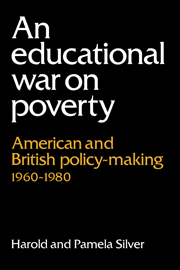Book contents
- Frontmatter
- Contents
- Acknowledgments
- List of abbreviations
- 1 Introduction: a proper complexity
- Part I A pattern of events: United States
- 2 Poverty and education: changing concerns and concepts
- 3 Education: children and intervention
- 4 Learning their way out of poverty?
- 5 Education and the prime target
- 6 An effort to understand
- Part II A pattern of events: Britain
- Part III Following through
- Interviews and consultation
- Bibliography
- Index
2 - Poverty and education: changing concerns and concepts
Published online by Cambridge University Press: 03 October 2009
- Frontmatter
- Contents
- Acknowledgments
- List of abbreviations
- 1 Introduction: a proper complexity
- Part I A pattern of events: United States
- 2 Poverty and education: changing concerns and concepts
- 3 Education: children and intervention
- 4 Learning their way out of poverty?
- 5 Education and the prime target
- 6 An effort to understand
- Part II A pattern of events: Britain
- Part III Following through
- Interviews and consultation
- Bibliography
- Index
Summary
Poverty and its related concerns and concepts leaped to the centre of the stage in American politics and educational and social policy in 1964–5, but the complex groundwork had been determined particularly in the previous decade. The key strands in the developments of the mid-1960s are visible in the late 1950s in terms of migration, slums and cities; civil rights and issues of race and desegregation; the interest of psychologists in early childhood and the effects of environment; the manpower concerns of cold war, Korean war and space race. By the early 1960s all of these were converging into a set of policy definitions given impetus and focus by the ‘discovery of poverty’. It was around the concept of poverty and associated social and educational phenomena that the new configuration of analyses and purposes took shape.
Poverty was not new to America, nor was the search for educational and other social remedies. American discomfort became acute in the 1960s, however, given new awareness of the nature and extent of its own strata of poverty and world preoccupation with poverty and hunger. What Americans learned most clearly at this point was that post-war hopes that their own poor and ‘pockets of poverty’ would diminish and disappear through sustained affluence had proved to be unfulfilled by the early 1960s. The British were to find similarly in the late 1950s that their post-war welfare state had also failed to eliminate poverty.
Post-war America held strongly to the view that the economic base of continuing prosperity was unassailable.
- Type
- Chapter
- Information
- An Educational War on PovertyAmerican and British Policy-making 1960–1980, pp. 13 - 29Publisher: Cambridge University PressPrint publication year: 1991



